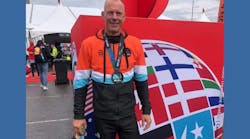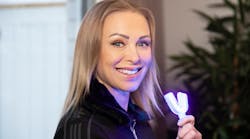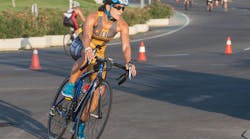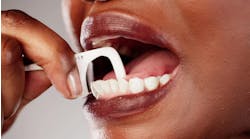Triathlon champion’s tips for improving oral health and overall well-being
Jarno Eerikäinen is a top-level Finnish triathlete with incredible success, particularly in the over-50 age group. Eerikäinen is also a well-known health advocate who combines intense training with his daily work in sales. He emphasizes the importance of oral health and incorporates advanced antibacterial treatment as part of his oral care routine.
Eerikäinen’s love for sports began in childhood. He has been an active athlete since the age of 6, engaging in soccer, skiing, fitness sports, mountain biking, cross-country skiing, and triathlon for the past five years. Skiing and triathlon are his current favorite sports.
“I have engaged in versatile sports since childhood and like to keep myself physically and mentally fit. Sports help me cope with everyday life, and I always find time for training. Competitions are nice boosts to test my fitness, but I would continue to exercise even if I didn’t compete,” says Eerikäinen.
Eerikäinen’s development in triathlon has been rapid. His achievements culminated in the summer of 2023 when he won two gold medals in his age group in triathlon and placed seventh and eighth in all men’s age groups.
Eerikäinen is known for his precision and dedication to sports. He successfully combines his intense training program with his daily work, training about 10–16 hours a week. The training includes swimming, cycling, running, and strength training.
“My training schedule varies depending on work, seasons, and competitions. Often, I train by swimming in the morning and going to the gym, cycling, or running in the afternoon, sometimes combining both. I can schedule my sales work well, and often, the first training session is early in the morning and the second in the afternoon, so training doesn’t affect my workday much.”
Personal well-being is the focus of sports
Eerikäinen believes that with the proper support and dedication, significant results can be achieved in sports, and his story is an inspiring example of what determined training and taking care of overall well-being can produce.
For him, personal well-being is the main focus of sports. He emphasizes the importance of oral health as an essential part of overall body wellness and athletic performance, and he has used an antibacterial treatment device (Lumoral) for his oral hygiene.
Using the Lumoral antibacterial device
“I consider oral health very important for general well-being. Before Lumoral, I took care of my teeth by brushing them twice daily and using dental floss irregularly. A few months ago, I went for a dental checkup. If the teeth or gums bother you, it constantly affects your mind and disrupts concentration. My mouth feels significantly cleaner after antibacterial treatment, even though I normally brush my teeth at least twice daily. The use has been easy, and the instructions are clear. The mouth heated up a bit during the first time, but that has now decreased. I have also downloaded the [accompanying] app to my phone and use it to measure the 10-minute treatment.”
Oral health: A growing topic among athletes
“I can’t say how much oral health affects performance, but due to carbohydrate consumption and electrolyte drinks with citric acid, there is a lot of strain on the mouth and teeth. Therefore, it is important to take special care of the mouth. Often, you don’t think about oral health until you notice pain or a problem in the mouth that distracts you,” he says.
According to Eerikäinen, oral health has recently become a more prominent topic in triathlon circles. Carbohydrate snacks, often consumed by athletes in the form of regular candies, liquids, and gels, put their teeth to the test.
“All carbohydrates are harmful to teeth if consumed too often, and in candy form, they stay longer in the mouth,” Eerikäinen explains. He uses carbohydrate-rich drinks during longer cycling workouts in the training season but notes, “Most of my workouts are short enough that there is no need for extra energy if I have eaten well before training. Sometimes, I brush my teeth after workouts. I have even used my antibacterial treatment device, for example, after longer workouts.”
Eerikäinen suggests that the use of energy candies and other sugar preparations should be moderate during training, even though they are essential in competitions. “Carbohydrates are crucial on long distances, and the body must be accustomed to receiving large amounts of them.”
What advice would he give active adults who want to find their inner fire for sports and improve their well-being?
“Find activities you enjoy, whether walking in nature, swimming, or going to the gym. Make sure the basics of your diet are in order and eat often enough to reduce cravings for treats. Alcohol should be consumed in moderation. My goal is to be in the best shape during competitions and to continue supporting my overall health and well-being through exercise and relatively healthy food.”
Following this interview, Jarno Eerikäinen continued his winning streak in the 50–54 age group and claimed new Finnish championships in three different triathlon distances during the summer: super sprint, sprint, and Olympic distance. He won the Finnish Championships Sprint (Pace 2024 triathlon) race held in Oittaa, Espoo, and the Finntriathlon competition in Joroinen, Finland, held in July.
Editor’s note: This article first appeared in Clinical Insights newsletter, a publication of the Endeavor Business Media Dental Group. Read more articles and subscribe.











